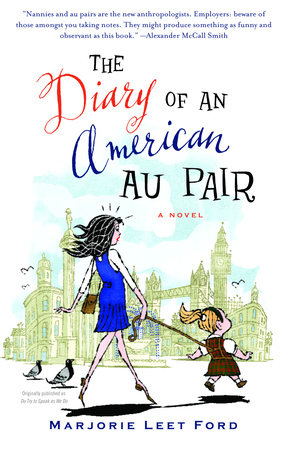The Diary of an American Au Pair Reader’s Guide
By Marjorie Leet Ford


1. How does Melissa convey her physical surroundings in the houses she lives in and visits so that the reader is able to share the experience? What does she love and what does she hate about the weather, the landscape, and the material aspects of her life in the British Isles? Why do the British in the novel seem to place less value on physical comfort than Americans?
2. How well does Ford convey the sensibility of a certain type of young woman: twentysomething, college-educated, naïve, romantic, and literary? Does the reader actually feel that he or she is reading Melissa’s diary? If so, how does Ford achieve this realism?
3. If Mrs. Haig-Ereildoun dislikes the American accent and American speech patterns so much, why has she hired an American to care for her children [pp. 4, 10–11, 46, 243]? How does this apparent inconsistency of intention reflect on Mrs. Haig Ereildoun’s character and motivations? Does Melissa come to understand the roots of her employer’s anger and unhappiness?
4. Is Melissa’s character admirable? What about her approach to her difficult situation? Do her strengths reflect her American upbringing, or are they simply a matter of temperament and adaptability?
5. The two main female characters in the novel seem somewhat old-fashioned in their approach to feminine roles. Mrs. Haig-Ereildoun didn’t take a first-class degree at Oxford so as not to outdo her husband-to-be [p. 150], while Melissa says, “I do love it, though, when the man pays for everything” [p. 176]. How important for the story is the fact that Melissa begins to earn money from her writing and is able to launch a new career as a food writer?
6. Considering Melissa’s loving relationship with Claire, why would Mrs. Haig-Ereildoun admit that had she known that Claire would be born deaf she would have had an abortion [p. 191]?
7. In what ways does the novel suggest that the Haig-Ereildouns, while members of the so-called ruling class, have been left behind by British society? How do the Haig-Ereildouns’ relationships with their servants reflect their allegiance to older ways? How does Mrs. Haig-Ereildoun in particular try to make Melissa feel that she is of an inferior social class?
8. Does the role of au pair inevitably put a young woman into a position of rivalry with the older woman for whom she is working? Does Mrs. Haig-Ereildoun see Melissa as a feminine rival with whom she has to compete for the love of her children and even, possibly, her husband? Melissa is a woman whose life is just beginning, while Mrs. Haig-Ereildoun seems to be embittered and disappointed. If this is the case, is jealousy the most natural explanation for Mrs. Haig-Ereildoun’s appalling treatment of Melissa?
9. Choose one particularly funny passage or episode, and discuss how its comic effects are achieved. Why is Melissa (and by extension the author) so good at making the people and situations she observes seem funny?
10. Considering that Mrs. Haig-Ereildoun’s expectations of Melissa’s services far exceed what they agreed upon and that Melissa isn’t being paid for much of the work she is doing, why doesn’t she quit? In sticking to her original plan of staying for six months, is she being mature or masochistic? Is she asking too much of herself, or is she giving herself a valuable experience?
11. How is Simon different from Tedward? What does he recognize as valuable in Melissa? How does Melissa come to realize that she shouldn’t marry Tedward and that she doesn’t need to (despite her assertion on p. 190)?
12. If we think of the novel as having a plot similar to that of the fairy tale of Cinderella, what is the reward for Melissa’s patience and humility? Is there a reason that she undergoes this trial? What does she learn? How satisfying is the novel’s ending, considering all that Melissa has gone through?
13. One reviewer noted that Ford has created, “in the most charming, gleeful way, a work of comparative anthropology” [The Observer (London), April 29, 2001]. What are the critical differences between American and British cultural behavior as observed by Melissa, and as demonstrated by her interactions with her employers and British friends? Does the novel suggest that the cultural divide is unbridgeable, or, on the contrary, insignificant in regard to the things that really matter?
Just for joining you’ll get personalized recommendations on your dashboard daily and features only for members.
Find Out More Join Now Sign In